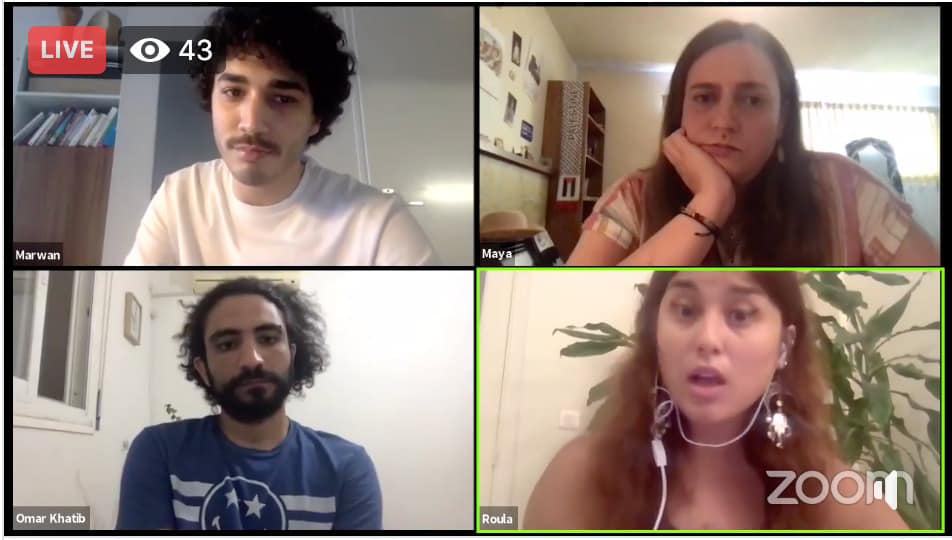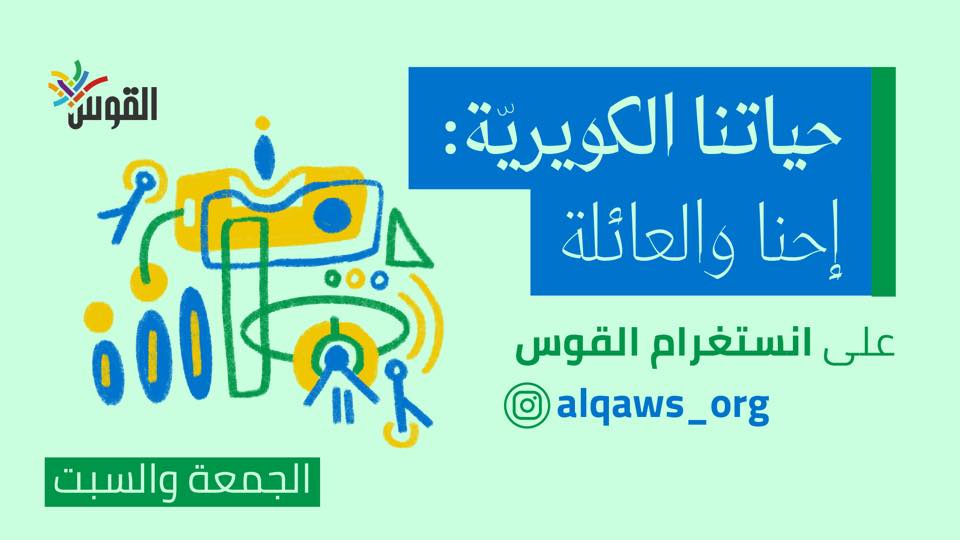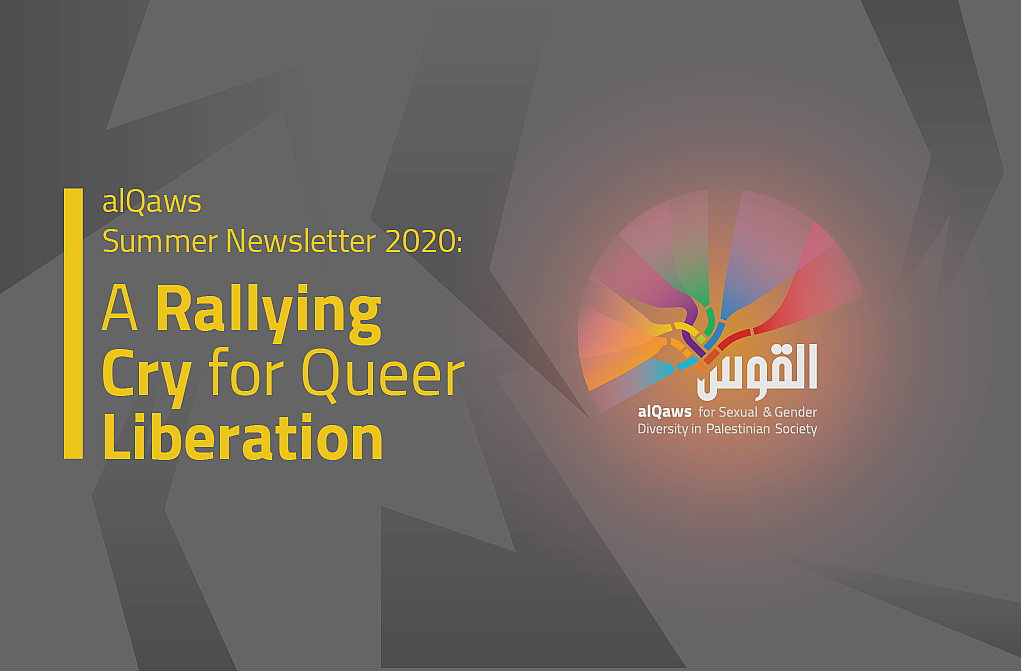In the past year, issues of sexual and gender diversity have become a consistent fixture in mainstream discourse. The space for social dialogue has broadened, elevating these issues within community forums to an unprecedented degree. Nevertheless, violent and reactionary sentiments continue to characterize popular debates in Palestine. This year we have seen that even in death, queer lives continue to be disputed, judged, and denied—a state of affairs that has elicited both pain and solidarity across Palestine and other countries in the region.
This same period witnessed public controversy erupt over a Palestinian food company’s donation to support a pinkwashing “Israeli” LGBTQ organization. The news coverage, along with the social media debates that followed, persistently erased queer Palestinian voices and revealed a profound ignorance about the interlocking systems of oppression that characterize our daily lives and struggles.
Issues that might have once been dismissed as marginal or irrelevant now find themselves at the heart of social and political discussions. The past two decades of political organizing and community building efforts, led by Palestinian queer feminist groups, have precipitated a radical divergence from the status quo, bringing an end to the era of hushed societal denial of queer existence and demands.
In the midst of these heated public debates, we came together from across Palestine to raise our collective voice at the “Rallying Cry for Queer Liberation.” We took to the streets to express our rage, to demand an end to violence against LGBTQ Palestinians, and to put forth a comprehensive vision of social and political liberation. This rally and recent shifts in public discourse reflect the profound impact of two decades of queer Palestinian mobilization, including several initiatives organized by alQaws in recent months.
Rallying Cry for Queer Liberation
On Wednesday, July 29th alQaws organized a protest at Al-Asir Square in Haifa under the banner of a “Rallying Cry for Queer Liberation.” This action marked a significant achievement despite the challenging circumstances that preceded it. The result was a powerful sight: drumbeats rang out, demonstrators raised Palestinian and queer flags, and banners and signs announced our cause to cameras and onlookers. Nearly two hundred demonstrators marched with us, chanting and speaking out with a mixture of rage, love and joy.
For the second year in a row we gathered in a public demonstration to confront, challenge, and reject the oppressive systems that do violence to us and our communities. In contrast to last year’s protest, the majority of participants this year were LGBT/queer. Many friends and allies from the feminist movement stood alongside them, in addition to a remarkable contingent of youth activists and supporters.
In the weeks leading up to the demonstration, alQaws mobilized widely to raise consciousness about the event, urging allies and peers to center queer voices and experiences. Posters announcing the event decorated the streets of Palestinian cities, from Jerusalem to Jaffa, Haifa, and Nazareth. As part of this effort, alQaws activists released a video about the importance of the protest and the queer liberation struggle, which reached more than twenty thousand views.
With care and caution, we worked to ensure that the protest was inclusive of all LGBT and queer Palestinians, regardless of political differences or lived experiences. In light of the covid-19 pandemic, we also paid close attention to safety and preventative measures by requiring attendees to wear masks and adhere to social distancing rules.
The protest concluded with a set of speeches from members of the feminist and queer movement. Ghadeer Al-Shafei from Aswat spoke about the importance of family support and community solidarity with queer issues. Hala Marshoud spoke for Tal3at, a movement that centers women’s liberation as a necessary tenet of Palestinian liberation, and emphasized the interconnected feminist and queer struggles against all forms of oppression. In the final speech, Haneen Maikey from alQaws echoed the collective pain and rage that moves us to fight against persecution and demand to be recognized as an integral part of our society. She foregrounded the challenges—and hopes—that lay in a movement towards radical transformation and community dialogue.
On Our Feelings: Tarwiha Comics Season 3
Over the past three months, alQaws released the third installment of Tarwiha, an online comics series about the experiences of LGBTQ teenagers grappling with questions about sexuality and gender. The first season for Tarwiha focused on school, while the second turned to examine family relationships. The third and most recent season looked at feelings: how they develop, how we deal with them, and how they are related to our understanding of gender and sexual diversity.
This season of Tarwiha aimed to give teenagers the space to contemplate and name their feelings in all of their complexities. It also encouraged readers to explore the political and social factors that influence their feelings, by drawing attention to how our emotional experiences are affected by the power structures we live within—from our families, to peer groups, to society and the state. The seven episodes addressed seven different feelings: loneliness, guilt, loss, self-hatred, anxiety, anger and jealousy. The season concluded with a closing eighth episode that discussed how we perceive our feelings collectively and respond to them.
.png)
Season 3 of Tarwiha provided an opportunity to discuss a topic that is seldom addressed: the personal feelings and emotional struggles of LGBT/queer teenagers. Each episode reached nearly four thousands views on alQaws’ social media accounts and the Tarwiha website.
In order to delve deeper into these themes, queer activists from alQaws partnered with the online publication Jeem to publish a series of personal essays based on Tarwiha. Each writer reflected on their own encounters with the feelings addressed in the comics, and wrote about how they came to understand these emotions and interact with them. The texts were published in Arabic on the Jadal section of Jeem’s website. Jadal, a virtual open space for community dialogue, publishes submissions without revision so long as they meet Jeem’s editorial standards. It therefore offered a unique, unfiltered discussion platform to engage audiences beyond Tarwiha’s target age group and highlight the voices of alQaws activists.
Online events: public webinars, educational initiatives, and discussion forums
In June, we held a public webinar in collaboration with a number of feminist and queer groups working in our region, including Jeem, The A Project, and Mawjoudin. This online session, the second of its kind for alQaws, examined significant incidents and regional current events that intersected with issues of sexual and gender diversity, with a special focus on the role of the media.

Hundreds of people tuned in for the live broadcast, with many participants raising questions and adding commentary. In the course of the interactive session, the speakers engaged audience members’ arguments and inquiries.The recording of the meeting was later published and watched by over five thousand viewers. After witnessing the impact of the first and second online sessions, we decided to expand our work with our partner organizations into a series of “Queer Discussions in the Region.” These discussions offer a space to speak about timely and relevant topics related to gender and sexual diversity within our regional context.
The shift to virtual spaces also helped us make our local queer activist spaces more accessible. During the month of July we held an advanced capacity building training that allowed us to delve deeper into sexuality and gender issues for alQaws local leadership in Jerusalem. Similar training courses - discussing basic concepts of sexuality, and advanced ones- have been held in Ramallah, Haifa, Jaffa, and Jerusalem during spring 2020, and we intend to continue hosting such sessions in the spirit of collective knowledge production and learning.
The introduction to this newsletter demonstrated the extent to which issues surrounding gender and seuxal diversity have been making headlines and attracting controversy during the past few months. The violent rhetoric and incidents that have accompanied this attention have predictably generated many thoughts and reactions within our communities, which prompted us to create another online space for reframing and reflecting on our feelings.
In order to open up the space to discuss these recent developments, we organized an online workshop at the end of July. The virtual format allowed us to transcend many of the imposed mobility barriers that restrict our work, with fifteen people from a variety of locations in attendance. A specialized group of facilitators from alQaws moderated, while participants focused on how to respond to recent events at the level of feelings and ideas. The workshop also explored the opportunities for social transformation that could emerge from such moments.
This workshop was the most recent installment in a series of online meetings titled “On the Question,” which first began in response to our need to meet virtually as a community during quarantine. Going forward, these workshops will continue to bring community members together to tackle the pressing daily concerns that arise from sexual and gender diversity issues.
Autumn Opportunities: Volunteer Hotline Training and the Academic School
After recuperating from the “Rallying Cry for Queer Liberation” protest, we returned to our organizing invigorated and prepared to bring enthusiam and energy to our next projects. In August, we opened registration for a training course for alKhat - Listening and Information Hotline. AlKhat is a volunteer hotline run by alQaws, which offers support and information to callers from across Palestine. Given the growing public discourse surrounding gender and sexuality, the need for this resource has only increased in recent months.
The training course launched at the beginning of this month and will continue for a total of twelve sessions. The course is a space for new volunteers to learn and discuss the knowledge and skills needed to actively engage with callers: from tackling personal challenges, listening and conversational skills, exploring volunteer-caller dynamics, and getting to know the work of alKhat.
At the beginning of August, we launched the call to register for alQaws’ fourth academic school, “Sexual Politics in the Colonial Context of Palestine”. This year’s theme, “From Pain to Hope: “From Pain to Hope: On Confronting the System” draws inspiration from the resistance shown by the queer and feminist movement in the past year. From the vantage point of these moments of confrontation, we look towards new horizons of hope and transformation.
.png)
Due to the ongoing pandemic, we converted our in-person 3-days academic school into an online learning platform where sessions will be held over five weeks. Each meeting, facilitated by a group of queer and feminist activists and academics from different backgrounds, will offer diverse materials and intellectual approaches to forty-five registered participants. The opening session took place on Saturday, September 5th and will continue through the first week of October, with a diverse group of attendees eager for discussion.
Our Very Own Queer Lives: Family and Us
“Our Very Own Queer Lives” is the title of alQaws’ online interactive learning space, which uses Instagram’s platform (specifically using Instagram’s story) to facilitate questions and commentary about topical issues while preserving the anonymity of participants. The first of these sessions, on the subject of relationships opened up a discussion on our experiences within interpersonal and romantic relationships. The second and most recent session turned to examine our relationships with our families.

The topic prompted candid conversations about the structure of our familial relationships, the attitudes of our family members towards our sexual orientations and gender identities, and our different roles within the family. Thousands of people engaged with the stories, which ran over the course of a weekend. alQaws activists facilitated the Instagram Q&A, responded to dozens of questions and comments, offered referrals to the Listening and Information Hotline, and shared multimedia resources such as films, songs, podcasts, and literary texts.
Partnership with Palestinian Voices in Diaspora
At the end of August, alQaws participated in a webinar titled “The Right to Narrate: No Justice Without Palestinian Voices” alongside a panel of Palestinian grassroots organizers and advocates based in Palestine and in the diaspora. Nasreen Abd Elal from alQaws spoke on the erasure of queer Palestinian perspectives from Western media coverage, as well as the radical possibilities for building power outside of the framework of the state and its institutions. She described alQaws’ role in offering a political home to queer and LGBT Palestinians, in order to collectively combat mainstream erasure and colonial fragmentation.
The speaker, Nasreen Abd Elal, participated in alQaws’ summer fellowship program, “Palestine Through the Lens of Queer Politics.” The fellowship seeks to integrate US-based Palestinian activists into the situated local work of alQaws and expand alQaws’ popular base of support abroad by uplifting queer Palestinian voices.

